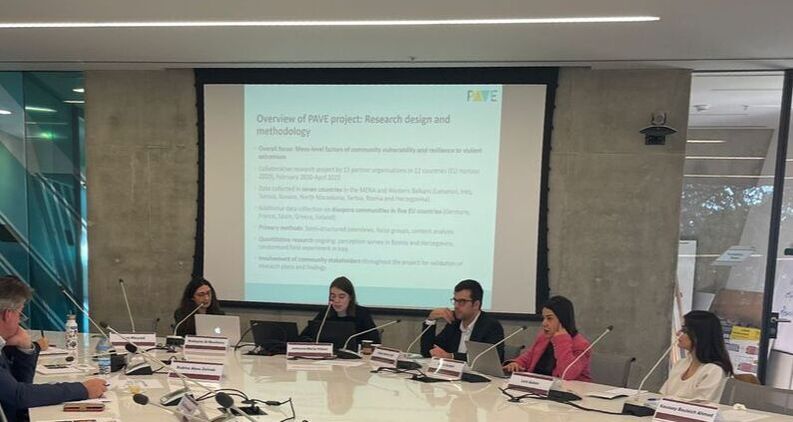Policy Roundtable: Preventing and Responding to Violent Extremism through Community Resilience12/9/2022
IFI in collaboration with La Fondation Maison des sciences de l’Homme- Paris (FMSH) and the Berghof Foundation, hosted a policy roundtable titled “Preventing and Responding to Violent Extremism through Community Resilience (PAVE)” on December 9, 2022. The roundtable aimed to gather representatives of the donor community working on Preventing and Countering Violent Extremism” (P/CVE) in Lebanon to share findings and discuss the evidence-based policy recommendations presented by the EU H2020 project PAVE. The panel included Rudayna Al-Baalbaky - Arab and International Program Coordinator at IFI; Lara Azzam - Senior Project Manager and Research Fellow at the Berghof Foundation; Johanna-Maria Hülzer - Junior Project Manager at the Berghof Foundation; Marie Kortam - Senior Research Fellow at La Fondation Maison des sciences de l’homme; and moderated by Josep Garcia Coll – Researcher at the Euro-Arab Foundation for Higher Studies. Preventing violent extremism on a community level has been an under-researched topic that lacks conceptualization. To overcome this obstacle, the EU funded the three-year PAVE project, which collected data across twelve countries from the Middle East, North Africa, the Western Balkans, and Europe. “Key outputs of the project include PAVE research reports that have been published on the project website. In addition, we are currently publishing a series of policy briefs compiling key recommendations for each country. We have developed a transnational risk and resilience map on the basis of our thematic work on diaspora communities. We have a forthcoming toolkit for practitioners and policy makers. Also, we are currently developing training tools based on all research findings which can be useful for practitioners.” -Johanna-Maria Hüzler In addition to introducing the PAVE project, the policy roundtable presented findings on drivers of both vulnerability and resilience to violent extremism in Lebanon. The research in Lebanon investigated Sunni, Shiite, and Maronite communities based on two main thematic clusters: the interactions between states and religious institutions and online and offline (de)radicalization. “From our side (La Fondation Maison des sciences de l’homme) we focused on the Sunni and Maronite communities. Regarding the Sunni community, we chose to focus on Saida city. The approach was territorial because of the work with the municipality. And many root causes of violent extremism in Lebanon are mainly territorial and spatial. For the Maronite community, it was an agency-network approach. In Saida city, we targeted state institutions and informal/formal religious leaders. In the Maronite community, we focused on the Free Patriotic Movement, a political party in Lebanon, and especially its deputies’ hate speech against Muslims and refugees in Lebanon. We also studied the interaction between the FPM and Maronite patriarch, bishops, Lebanese Forces political party, plus some experts.” -Marie Kortam “One of the aspects of the power-sharing system in Lebanon is the structural intersection between the spheres of formal Sunni religion and political parties. The interaction between these official institutions can both act as a factor of community vulnerability and resilience towards the acts and discourse of violent extremism. Variables such as the political affiliation of state and religious institutions, the leadership of the dominant political party, political polarization, and regional powers’ intervention, play a role in this interaction. The effects that these variables produce are determined by the scope (community- or state-level) of the analysis.” -Rudayna Al-Baalbaky “In our field site of Majdal Anjar, during the period from 2000 to 2010, radicalization mainly took place offline, such as through the circulation of audio tapes and videos from abroad. Young people from Majdal Anjar would gather to watch violent videos of the war in Iraq that made them feel either collectively victorious or collectively victimized. From 2010 onwards, social media was the main medium of radicalization, particularly on Telegram. This was coupled with the feeling of disenfranchisement that is associated with being a Lebanese Sunni under the perceived Hezbollah domination. Sources of offline radicalization include books through which jihadist theorists Abu Muhammad al-Maqdisi and Abu Qatada disseminated Salafi-Jihadi ideology. Those same books became some of the material used for online radicalization, uploaded on social media platforms, circulated and discussed among jihadi circles and referenced in recruitment processes,” -Lara Azzam The discussed findings are included in PAVE Working Paper 4 and Working Paper 6. By presenting key findings on violent extremism in Lebanon, the policy roundtable aimed to provide context-adaptable policy recommendations to the donors and partners of Preventing Violent Extremism (PVE) in Lebanon.
The presentation was followed by a Q&A session, with representatives from the Lebanese National PVE Coordination Unit, Australian Embassy, European Union, French Embassy, Japanese Embassy, and International and Ibero-American Foundation for Administration and Public Policies. Comments are closed.
|
Archives
July 2024
|

